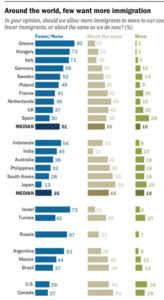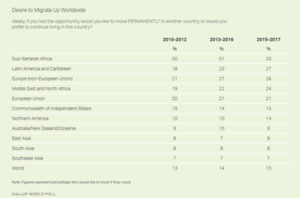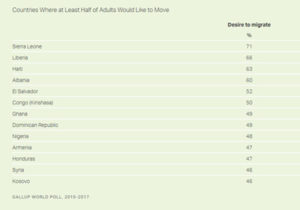Surveys reveal ‘Great Migration Clash’
As the COVID-19 pandemic and the rising effects of climate change fuel fears in the minds of millions of people across the globe, a bitter clash is looming between people who want to migrate out of their precarious positions and those who want to block entry to foreigners.
This ‘Great Migration Clash’ is evident in recent surveys which show that more than a billion people would like to move permanently to another country if they could; and a similar number say fewer or no migrants should be allowed to enter their countries.
 Unsurprisingly, the populations with the largest percentages wanting to emigrate are in poor and violence ridden countries. In many of these nations, half or more of the populations say they would like to migrate permanently to another country, mostly to Europe and North America.
Unsurprisingly, the populations with the largest percentages wanting to emigrate are in poor and violence ridden countries. In many of these nations, half or more of the populations say they would like to migrate permanently to another country, mostly to Europe and North America.
For example, more than 60 percent of the populations in Sierra Leone, Liberia and Haiti want to leave permanently.
In Nigeria, Africa’s largest country by population, about half of the 200 million population want to resettle abroad, preferably in an English-speaking country. And almost half of the women of Afghanistan say they would leave the country permanently if they could. Afghan women are the world’s least satisfied because of limited access to education, employment and civil participation, the surveys show.
A report by polling organisation Gallup shows that 15 per cent of the world’s population, or more than one billion people, would migrate to another country if they could.
 The figures are highest in sub-Saharan Africa (33 per cent), Latin America (27 per cent) and Middle East and North Africa (24 per cent).
The figures are highest in sub-Saharan Africa (33 per cent), Latin America (27 per cent) and Middle East and North Africa (24 per cent).
But some countries in the developed world also have high proportions wanting to immigrate, such as Russia, at 20 per cent.
The current (pre-COVID) annual number of immigrants is around 5 million, a fraction of the numbers wanting to migrate.
And the total number of immigrants worldwide is also relatively small; about 275 million or less than a quarter of the total those wanting to leave their homelands.
On the other side of this equation are those wanting to stop migrants entering their countries.
Research by the Washington-based think tank the Pew Center shows a median of 45 per cent of people across the world say fewer or no immigrants should be allowed to move to their country.
 About 36 per cent say they want about the same number of immigrants and just 14 per cent say their countries should allow more immigrants.
About 36 per cent say they want about the same number of immigrants and just 14 per cent say their countries should allow more immigrants.
In Europe, majorities in Greece (82 per cent), Hungary (72 per cent), Italy (71 per cent) and Germany (58 per cent) top the list, saying fewer immigrants or no immigrants at all should be allowed to move to their countries.
All of these countries were popular transit or destination points during Europe’s recent surge in asylum seekers.
But people in other countries also hold similar views on migration. Large majorities in Israel (73 per cent), Russia (67 per cent), South Africa (65 per cent) and Argentina (61 per cent) say their countries should let in fewer immigrants.
By contrast, in Australia, 32 per cent said there should be fewer migrants, 42 per cent said the number was about right and 18 per cent said there should be more.
But in every country surveyed by the Pew Center, less than a third say their nation should allow more immigrants to enter.
Worldwide, a record 258 million people lived outside their country of birth in 2017, up from 153 million in 1990.
Their share of the global population is also up, reaching 3.4 per cent in 2017, compared with 2.9 per cent in 1990.
The Great Migration Clash is intensifying, especially with the economic fallout of the COVID-19 pandemic. This is affecting poorest countries and regions hardest.
But forces, such as demographic shifts, climate change, poverty, hunger, violence and armed conflict, are continuing to fuel the worldwide migration aspirations.
Conditions in migrant-origin countries are almost universally harsh and have worsened in many places because of climate change and environmental factors; and more recently the COVID-19 pandemic.
Housing can be substandard, educational opportunities non-existent and health care limited – meaning many family struggle at subsistence levels.
In some places – notably Africa and Central America – violence, armed conflict and human rights abuses also contribute to people wanting to emigrate.
In contrast, destination countries offer opportunities, freedoms, rights and safety and security; as well as improved chances for better and more secure lives for the children of aspiring migrants.
In recent years, destination countries favoured by prospective migrants have been the same group of wealthy, stable nations.
The most desired destination, favoured by 20 per cent of potential migrants has been the US, followed Canada, Germany, France, Australia and the United Kingdom.
Since the 1951 Convention Relating to the Status of Refugees was adopted, the global population has tripled from 2.6 billion to 7.8 billion, with more than 90 percent of that growth occurring in developing countries.
Over the next three decades world population is expected to add another two billion people, before declining towards the end of the century. Virtually all of that future population increases will occur in the developing world, with Africa accounting for 60 per cent. About twenty countries in Africa will see at least a doubling in population size by 2050.
The Gallup and Pew surveys show that the supply of potential migrants in developing countries vastly outnumbers the places for migrants in developed countries.
So, increasing numbers of people who want to leave their countries are resorting to irregular migration, often relying on people smugglers.
In response, many migrant-destination countries are making the entry of irregular migrants more difficult, attempting to send home people who arrive irregularly, seeing public sentiment turn against accepting refugees and increasingly denying asylum claims.
And the recent political rise of populist, nationalist right-wing political parties is, at least in part, because of issues around immigration.
Recent regional and international efforts including the recently adopted Global Compact for Safe, Orderly and Regular Migration and Global Compact of Refugees appear not to be changing the narrative.
See the full survey reports here:
https://news.gallup.com/poll/245255/750-million-worldwide-migrate.aspx












